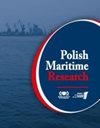Reduction of CO2 Emissions from Offshore Combined Cycle Diesel Engine-Steam Turbine Power Plant Powered by Alternative Fuels
IF 2
3区 工程技术
Q2 ENGINEERING, MARINE
引用次数: 0
Abstract
Abstract Diverse forms of environmental pollution arise with the introduction of materials or energy that exert adverse effects on human health, climate patterns, ecosystems, and beyond. Rigorous emission regulations for gases resulting from fuel combustion are being enforced by the European Union and the International Maritime Organization (IMO), directed at maritime sectors to mitigate emissions of SO x , NO x , and CO 2 . The IMO envisions the realisation of its 2050 targets through a suite of strategies encompassing deliberate reductions in vessel speed, enhanced ship operations, improved propulsion systems, and a transition towards low and zero-emission fuels such as LNG, methanol, hydrogen, and ammonia. While the majority of vessels currently depend on heavy fuel or low-sulphur fuel oil, novel designs integrating alternative fuels are gaining prominence. Technologies like exhaust gas purification systems, LNG, and methanol are being embraced to achieve minimised emissions. This study introduces the concept of a high-power combined ship system, composed of a primary main engine, a diesel engine, and a steam turbine system, harnessing the energy contained within the flue gases of the main combustion engine. Assumptions, constraints for calculations, and a thermodynamic evaluation of the combined cycle are outlined. Additionally, the study scrutinises the utilisation of alternative fuels for ship propulsion and their potential to curtail exhaust emissions, with a specific focus on reducing CO 2 output.替代燃料驱动的海上柴油机-汽轮机联合循环电厂二氧化碳排放的减少
随着对人类健康、气候模式、生态系统等产生不利影响的材料或能源的引入,各种形式的环境污染也随之产生。欧盟和国际海事组织(IMO)正在对燃料燃烧产生的气体实施严格的排放法规,旨在减少海事部门的SO x、NO x和CO 2的排放。国际海事组织设想通过一系列战略来实现其2050年的目标,包括故意降低船舶速度,增强船舶运营,改进推进系统,以及向LNG、甲醇、氢和氨等低排放和零排放燃料过渡。虽然目前大多数船舶依赖于重质燃料或低硫燃料油,但集成替代燃料的新型设计正日益突出。废气净化系统、液化天然气和甲醇等技术正在被采用,以实现最大限度的排放。本研究介绍了一种大功率联合船舶系统的概念,该系统由一台主主机、一台柴油机和一个蒸汽轮机系统组成,利用主内燃机的烟道气所含的能量。假设,限制计算,和热力学评价的联合循环概述。此外,该研究还详细审查了船舶推进替代燃料的利用及其减少废气排放的潜力,特别关注减少二氧化碳排放。
本文章由计算机程序翻译,如有差异,请以英文原文为准。
求助全文
约1分钟内获得全文
求助全文
来源期刊

Polish Maritime Research
工程技术-工程:海洋
CiteScore
3.70
自引率
45.00%
发文量
20
审稿时长
>12 weeks
期刊介绍:
The scope of the journal covers selected issues related to all phases of product lifecycle and corresponding technologies for offshore floating and fixed structures and their components.
All researchers are invited to submit their original papers for peer review and publications related to methods of the design; production and manufacturing; maintenance and operational processes of such technical items as:
all types of vessels and their equipment,
fixed and floating offshore units and their components,
autonomous underwater vehicle (AUV) and remotely operated vehicle (ROV).
We welcome submissions from these fields in the following technical topics:
ship hydrodynamics: buoyancy and stability; ship resistance and propulsion, etc.,
structural integrity of ship and offshore unit structures: materials; welding; fatigue and fracture, etc.,
marine equipment: ship and offshore unit power plants: overboarding equipment; etc.
 求助内容:
求助内容: 应助结果提醒方式:
应助结果提醒方式:


